Browse by Series/Collection
Group by: No Grouping | No Grouping Number of items: 28. (Re-)inventing the Dublin System: Addressing Uniformity and Harmonization through Non-Refoulement Obligations
Recent events unfolding in the European Union have taught us that responsibility-sharing under the current Dublin Convention and Regulations (the “Dublin System”), has long failed its lofty goals. To adequately address the ongoing needs of massive influx of asylum claimants into EU member states, ... [ more ] Recent events unfolding in the European Union have taught us that responsibility-sharing under the current Dublin Convention and Regulations (the “Dublin System”), has long failed its lofty goals. To adequately address the ongoing needs of massive influx of asylum claimants into EU member states, a centralized system processing these claims is necessary, instead of allowing individual member states to interpret their own compliance with non-refoulement obligations. A larger role should be played by the European Court of Human Rights (“ECtHR”) and Court of Justice of the European Union (“CJEU”) in order to curtail EU member state sovereignty to champion the rights of individual asylum claimants. Now more than ever, the right against refoulement must be safeguarded amidst internal strife on the political front. In order to achieve true uniformity and harmonization by adhering to non-refoulement obligations, the Dublin System as it is must be reformed to include a forum for the individual asylum claimants to be heard, an enlarged role of the ECtHR and CJEU in the adjudication of cases involving state discretion, as well as a centralized distribution system that processes asylum applications through a pooling of resources from EU member states. | Author : Poon, Jenny Date : 20 July 2016 Source : Working Paper. University of Birmingham. Collection : IEL Working Papers | ![[img]](/2183/1.hassmallThumbnailVersion/IELWorkingPaper2016No2_(Re)inventing_the_Dublin_System.pdf) inventing_the_Dublin_System.pdf) Preview |
|
| A Legal Perspective on Nuclear Back-End Management in the Circular EconomyTo what extent can circular economy principles enhance the sustainability of nuclear energy? To what extent does the Dutch regulatory framework for nuclear back-end management allow for the transition to a circular economy? | Author : Mahlert, Colleen Date : 08 December 2022 Source : Working Paper. University of Birmingham. Collection : IEL Working Papers | ![[img]](/style/images/fileicons/application_pdf.png) ![]() Preview |
|
| A ‘right to have rights’ in the EU public sphere? An Arendtian justification for the application of the EU Charter of Fundamental RightsThis paper discusses the Court’s reasoning in interpreting the EU Charter, using recent case law on horizontal effect as a case study. It identifies two possible means of interpreting the provisions of the Charter: firstly, an approach based on common values (e.g. equality or solidarity) and, second... [ more ] This paper discusses the Court’s reasoning in interpreting the EU Charter, using recent case law on horizontal effect as a case study. It identifies two possible means of interpreting the provisions of the Charter: firstly, an approach based on common values (e.g. equality or solidarity) and, secondly, an approach based on access to the public sphere. It argues in favour of the latter. Whereas an approach based on common values is more consonant with the development of the case law so far, it is conceptually problematic: it involves subjective assessments of the importance and degree of ‘sharedness’ of the value in question, which can undermine the equal constitutional status of different Charter provisions. Furthermore, it marginalises the Charter’s overall politically constructional character, which distinguishes it from other sources of rights protection listed in Art 6 TEU. The paper argues that, as the Charter’s provisions concretise the notion of political status in the EU, they have a primarily constitutional, rather than ethical, basis. Interpreting the Charter based on the very commitment to a process of sharing, drawing on Hannah Arendt’s idea of the ‘right to have rights’ (a right to access a political community on equal terms), is therefore preferable. This approach retains the pluralistic, post-national fabric of the EU polity, as it accommodates multiple narratives about its underlying values, while also having an inclusionary impact on previously underrepresented groups (e.g. non-market-active citizens or the sans-papiers) by recognising their equal political disposition. | Author : Frantziou, Eleni Date : 2016 Source : Working Paper. University of Birmingham. Collection : IEL Working Papers | ![[img]](/2192/1.hassmallThumbnailVersion/IEL_Working_Paper_9%2D2016_%2D_A_%E2%80%98right_to_have_rights%E2%80%99_in_the_EU_public_sphere.pdf) 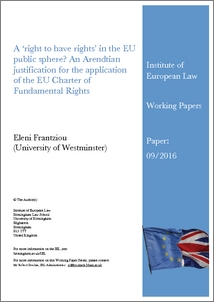 Preview |
|
| Asymmetrical Sovereignty, European Integration, and the Grey Zone of European Union Politics This study highlights both the significance and impact of the developing changes in the last decades around Europe, the notion-related adjustments that remain to be carried and in parallel to provide a more general explanation concerning the institution of sovereignty in relation to the process of E... [ more ] This study highlights both the significance and impact of the developing changes in the last decades around Europe, the notion-related adjustments that remain to be carried and in parallel to provide a more general explanation concerning the institution of sovereignty in relation to the process of European integration. The main questions that this article seeks to answer are the following: Who governs who within the EU? How does the European nexus of institutions and governance affect sovereignty? Which are the main consequences of the Maastricht’s framework in relation to sovereignty? In order to provide an answer to the above questions, we intend to analyze the relationship of the institution of sovereignty and the ability of exercising independent economic policy within the EMU as well as reexamine the development of this relationship in close regard to the process of European integration. The major contribution of this research is that offers a complementary study in order to understand better the relationship between European integration and state sovereignty. This research integrates sovereignty in the current debates, and provides an exegesis not only for the main factors that affect the transformation of the EMU but also for the limits of the European integration. | Author : Maris , Georgios and Sklias, Pantelis Date : 2016 Source : Working Paper. University of Birmingham. Collection : IEL Working Papers | ![[img]](/2187/1.hassmallThumbnailVersion/IELWorkingPaper2016No4_Asymmetrical_Sovereignty.pdf) 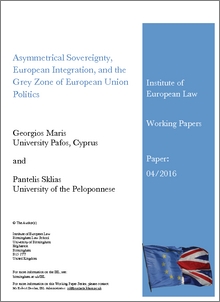 Preview |
|
| Energy governance in EU-Russia energy relations: paving the way towards an energy unionEU-Russia relations are in desperate need of legislative and institutional reform given the fragmented legal infrastructure regulating energy trade between these two powers. The paper will argue that the energy partnership is a highly strategic relationship that has profound implications for the int... [ more ] EU-Russia relations are in desperate need of legislative and institutional reform given the fragmented legal infrastructure regulating energy trade between these two powers. The paper will argue that the energy partnership is a highly strategic relationship that has profound implications for the international arena as far as energy security and stability are concerned, for which a solid over-arching legal framework is required. Other simmering issues include the absence of reciprocity in energy market access and the lack of coherence in external EU energy relations which has resulted in bilateralism emerging as the default approach of engagement. These issues are interrelated and closely affiliated to the need for a revised bilateral and international legal framework, as diverse positions and a lack of cooperation amongst Member States undermine collective EU actions and legislative initiatives. In this respect the paper advocates that the Energy Union may be a comprehensive solution to these challenges, by implementing a cohesive and fully functioning energy policy that will strengthen EU solidarity and coherence in the Union’s external relations, thereby bolstering EU energy security. | Author : Georgiou, Natasha A. and Rocco, Andrea Date : 13 January 2017 Source : Working Paper. University of Birmingham. Collection : IEL Working Papers | ![[img]](/2944/1.hassmallThumbnailVersion/IEL_Working_Paper_01%2D2017.pdf)  Preview |
|
| Enforcing compliance of the Rule of Law by the Member
States of the EU: Emphasising the EU’s Failure?The EU is founded on the rule of law enshrined in Article 2 TEU. Nevertheless, recent developments within certain Member States demonstrate that not all Member States are able to keep up with the high standards of the rule of law during their membership. The EU has several tools at its disposal to a... [ more ] The EU is founded on the rule of law enshrined in Article 2 TEU. Nevertheless, recent developments within certain Member States demonstrate that not all Member States are able to keep up with the high standards of the rule of law during their membership. The EU has several tools at its disposal to act against non-compliant Member States, such as the Cooperation and Verification Mechanism for Romania and Bulgaria, the nuclear option of Article 7 TEU, and the original infringement procedure under Article 258 TFEU. The European Commission has established a new EU Rule of Law Framework in 2014, which is applied for the first time for Poland. This suggest that the EU is not able to enforce the compliance of the rule of law effectively by using its original legal framework. The question, thus, raises whether the new mechanism will enable the EU to enforce effectively the compliance of the rule of law by the Member States. Based on an extensive assessment of the original legal framework and the EU Rule of Law Framework, the state of play of the EU to enforce the compliance of the rule of law will be analysed. | Author : Gremmelprez, Femke Date : 2016 Source : Working Paper. University of Birmingham. Collection : IEL Working Papers | ![[img]](/2191/1.hassmallThumbnailVersion/IEL_Working_Paper_8%2D2016.pdf) 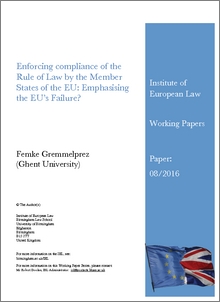 Preview |
|
| Enhanced cooperation - a suitable means to further integration? | Author : Böttner, Robert Date : 03 August 2018 Source : Working Paper. University of Birmingham. Collection : IEL Working Papers | ![[img]](/3141/1.hassmallThumbnailVersion/IEL_Working_Paper_02%2D2018%2Dboettner.pdf) 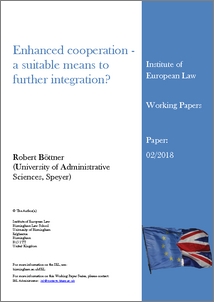 Preview |
|
| European Union Law and Public ProcurementThis paper discusses the law of the European Union (EU) on public procurement by providing an overview of both the primary law principles and foundations emanating from the Treaty on the Functioning of the European Union (TFEU) and the detailed rules of a set of secondary procurement Directives. The... [ more ] This paper discusses the law of the European Union (EU) on public procurement by providing an overview of both the primary law principles and foundations emanating from the Treaty on the Functioning of the European Union (TFEU) and the detailed rules of a set of secondary procurement Directives. The latter have to be transposed into the national laws of the 28 Member States and are then applied by their contracting authorities and entities. The analysis also includes the relevant case law of the Court of Justice of the European Union (CJEU) and a short evaluation of the principles applying to contracts falling outside the field of application of the procurement Directives. | Author : Trybus, Martin (Professor) Date : 30 October 2017 Source : Working Paper. University of Birmingham. Collection : IEL Working Papers | ![[img]](/3052/1.hassmallThumbnailVersion/IEL_Working_Paper_05%2D2017_%2D_Trybus.pdf) 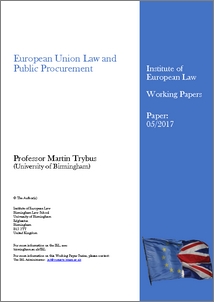 Preview |
|
| FTA dispute settlement mechanisms – alternative fora for trade disputes: the case of CETA and EUJEPAThis paper investigates whether in the context of the Appellate Body crisis and the more developed FTA norms, the dispute settlement mechanisms contained in EU FTAs, particularly CETA and EUJEPA, could emerge as attractive alternative fora for solving trade disputes. The paper will analyze potential... [ more ] This paper investigates whether in the context of the Appellate Body crisis and the more developed FTA norms, the dispute settlement mechanisms contained in EU FTAs, particularly CETA and EUJEPA, could emerge as attractive alternative fora for solving trade disputes. The paper will analyze potential substantive and procedural aspects that would shape the answer to the posed question. It will argue that CETA and EUJEPA dispute settlement mechanisms could become partial attractive bilateral alternatives to solve trade disputes between the parties. However, it will also show that there are certain aspects that will act against these mechanisms. | Author : Furculita, Cornelia Date : 12 June 2020 Source : Working Paper. University of Birmingham. Collection : IEL Working Papers | ![[img]](/3289/2.hassmallThumbnailVersion/IEL%2DWP%2D2020%2D001%2DFurculita.pdf) 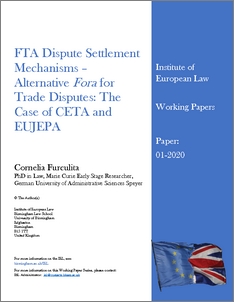 Preview |
|
| Fundamental rights in the institutional architecture of EU trade agreements: a tale of omissionsThis paper explores the institutional dimension of the implementation of the new generation EU Free Trade Agreements (FTAs) from a fundamental rights perspective. The creation of an institutional architecture of EU FTAs is what makes them operational. It enables the other dimensions to become “alive... [ more ] This paper explores the institutional dimension of the implementation of the new generation EU Free Trade Agreements (FTAs) from a fundamental rights perspective. The creation of an institutional architecture of EU FTAs is what makes them operational. It enables the other dimensions to become “alive” and not to remain words within a text. Given the plethora of entities created by the new generation of EU FTAs, this paper investigates the extent to which the institutional architecture of EU FTAs is adequate to protect and promote fundamental rights. This investigation shows that, despite significant novelties, several limitations remain. Gaps in the mandate and deficiencies in the decision-making processes lead to foresee little consideration of fundamental rights at the implementation stage. | Author : Mancini, Isabella Date : 08 July 2020 Source : Working Paper. University of Birmingham. Collection : IEL Working Papers | ![[img]](/3295/1.hassmallThumbnailVersion/IEL2020IMancini_IEL_WorkingPaper2002%2D03.pdf)  Preview |
|
| General principles of EU law as a passe-partout key within the constitutional edifice of the European Union: are the benefits worth the side effects? | Author : Gualco, Elena Date : 2016 Source : Working Paper. University of Birmingham. Collection : IEL Working Papers | ![[img]](/2188/1.hassmallThumbnailVersion/IELWorkingPaper2016No5.pdf) 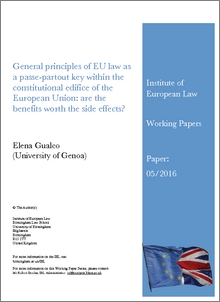 Preview |
|
| Is There a Tomorrow for the Economic and Social Committee (EESC) and the Committee of the Regions (CoR)? The main purpose of the two Committees is to engage participation from citizens in order to ensure that EU laws are geared to economic, social and regional conditions. In their core, the Committees are advisory bodies whose purpose is to give interest groups a formal say on EU legislative proposals.... [ more ] The main purpose of the two Committees is to engage participation from citizens in order to ensure that EU laws are geared to economic, social and regional conditions. In their core, the Committees are advisory bodies whose purpose is to give interest groups a formal say on EU legislative proposals. Moreover, the CoR has a legal mechanism (an action for annulment) to control the EU legislation. Thus far, there has been much criticism about the effectiveness of their work and the irrational costs that the two Committees produce. However, they represent the decrease of the democratic deficit, which seems to be one of the EU’s incurable diseases. In order to reach a conclusion on the necessity and effectiveness of the two Committees, this paper shall focus on their influence in the legislative procedure and try to determine whether the influence is visible and valuable. Finally, the paper shall assess the effectiveness of the single judicial instrument for control: an action for annulment that the CoR can bring before the CJEU. In accordance with the research results, the paper shall propose one of the possible solutions for the Committees’ future: status quo, the merger of the EESC and CoR into a more effective body or their complete abolition. | Author : Petrašević, Tunjica and Duić, Dunja Date : 2016 Source : Working Paper. University of Birmingham. Collection : IEL Working Papers | ![[img]](/2189/1.hassmallThumbnailVersion/IEL_Working_Paper_6%2D2016.pdf) 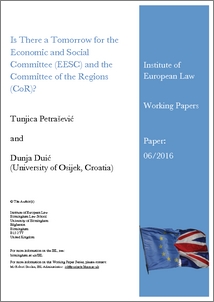 Preview |
|
| Labour Standards and Mega-Regionals: Innovative Rule-Making or Sticking to the Boilerplate?
The requirement to adopt minimum labour standards is now standard practice in free trade agreements negotiated by major trading powers such as the EU and US. However, such practice has historically been contested by developing countries, who contend that the requirement to increase labour and social... [ more ] The requirement to adopt minimum labour standards is now standard practice in free trade agreements negotiated by major trading powers such as the EU and US. However, such practice has historically been contested by developing countries, who contend that the requirement to increase labour and social protection standards is designed to remove one of the few competitive advantages that developing countries have over developed countries in attracting foreign investment. More recently, the EU and the US have also sought to use so-called ‘mega-regionals’ to promote labour standards. This was a significant development in that their proponents were keen to stress that these agreements would set the benchmark for labour protection provisions in FTAs, readily admitting that one of the central aims pursued by such agreements was to redefine the rules of the global trading system. The paper aims to assess the labour standards provisions included in EU and US FTAs, determine the rationale behind the inclusion of such provisions, and examine the extent to which mega-regionals such as the TTIP and the TPP marked a significant departure from past practice. | Author : Melo Araujo, B. A. (Dr) Date : 19 May 2017 Source : Working Paper. University of Birmingham. Collection : IEL Working Papers | ![[img]](/2991/1.hassmallThumbnailVersion/IEL_Working_Paper_03%2D2017_%2D_melo%2Daraujo.pdf) 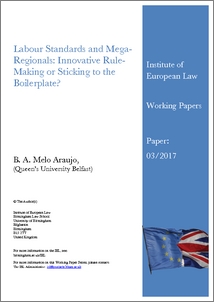 Preview |
|
| Of the State of the (European) Union and of Trade Deals
| Author : Sharpston, Eleanor Date : 16 February 2017 Source : Working Paper. University of Birmingham. Collection : IEL Working Papers | ![[img]](/2964/1.hassmallThumbnailVersion/sharpston%2DIEL_Working_Paper_02%2D2017.pdf) 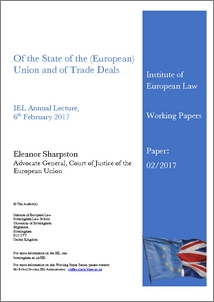 Preview |
|
| Pork, Peace and Principles: the Relations between the EU and the Eurasian Economic UnionOver the last decade the EU faced numerous calls to engage with the Customs Union between Russia, Belarus and Kazakhstan set up in 2010 and its successor, the Eurasian Economic Union (EAEU), found in 2015. While proponents differ in terms of their justification and desired scope of cooperation, they... [ more ] Over the last decade the EU faced numerous calls to engage with the Customs Union between Russia, Belarus and Kazakhstan set up in 2010 and its successor, the Eurasian Economic Union (EAEU), found in 2015. While proponents differ in terms of their justification and desired scope of cooperation, they share the view that it should take place on a region-to-region basis, thus representing an important departure from the EU's approach to the post-Soviet countries. The EU's reluctance to embark on such a course so far has been attributed to the political crisis of EU-Russia relations, especially in the aftermath of the annexation of Crimea and the war in Eastern Ukraine. In this context, for some, a mega-deal contains not just the promise of economic cooperation and connectivity, but also represents the means to improve relations with Russia and restore peace and stability in Europe. This paper argues that while these are worthy objectives, the utility of a region-to-region engagement with the EAEU should be premised on a realistic assessment of the nature of Eurasian integration as well as informed by the priorities in EU's external economic relations following its 2006 Global Europe strategy, more generally. To this end, the paper examines the EAEU against three particular dimensions: the extent to which it represents a unified regional actor, its trade liberalisation credentials and its ability to meet the EU's values conditionality. It concludes that the EAEU's institutional set up and practice exhibits fundamental problems in all of them. This means that the expected benefits of a regional mega-deal with the EAEU are highly uncertain, but also that moving away from a bilateral mode of engagement will entail significant departures from EU's principles and approach to external relations more generally. | Author : Dragneva-Lewers, Rilka Date : 07 June 2019 Source : Working Paper. University of Birmingham. Collection : IEL Working Papers | ![[img]](/3219/1.hassmallThumbnailVersion/IEL_Working_Paper_02%2D2019_Dragneva%2DLewers.pdf) 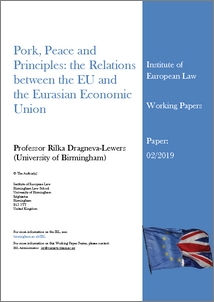 Preview |
|
| Putting a price on human rights? A policy-based approach for the protection of human rights in EuropeOngoing political uncertainty in Europe, as a result of, inter alia, Brexit, the rise of populism and nationalism, places the fundamental principles of democracy, rule of law and human rights under threat across the entire continent. The European Commission, in seeing certain EU Member States adopti... [ more ] Ongoing political uncertainty in Europe, as a result of, inter alia, Brexit, the rise of populism and nationalism, places the fundamental principles of democracy, rule of law and human rights under threat across the entire continent. The European Commission, in seeing certain EU Member States adopting national policies that severely compromise the state of the rule of law within the Union and in an effort to compel them to honour their international legal obligations, has recently proposed to make access to EU funds conditional on the respect for the rule of law. In critically analyzing this proposal, this paper presents a series of skepticisms on the wider human rights situation within Europe. Particularly, the paper questions whether the current juridical paradigm for human rights protection has been proven ineffective, whether alternative methods of protection are needed and whether funds could promote the rule of law and human rights in Europe. The paper concludes by suggesting that a paradigm shift, from a rights-based to a policy-based system, which includes diplomatic and economic incentives, could be an effective and appropriate response to the rule of law backsliding in the EU and a plausible alternative for the protection of human rights across Europe. | Author : Xenofontos , Stefanos Date : 03 August 2018 Source : Working Paper. University of Birmingham. Collection : IEL Working Papers | ![[img]](/3142/1.hassmallThumbnailVersion/IEL_Working_Paper_03%2D2018%2Dxenofontos.pdf) 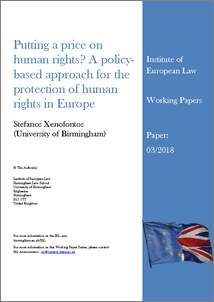 Preview |
|
| Regulatory cooperation in EU FTAs: characteristics of the reestablished practiceRegulatory cooperation is a complex and multifarious concept. Its multimodality applies not only to the forms it can take but also to the fora where it may appear. Although regulatory cooperation does not constitute a new trend in EU trade, its current state represents an original development. Regul... [ more ] Regulatory cooperation is a complex and multifarious concept. Its multimodality applies not only to the forms it can take but also to the fora where it may appear. Although regulatory cooperation does not constitute a new trend in EU trade, its current state represents an original development. Regulatory cooperation is now treated as a separate phenomenon in the new generation of free trade agreements (FTAs), raising several questions. What is the significance of this change? How does bilateralism as an external relations tool fit into a concept that partially falls under trade and partially under rule-making? Since regulatory cooperation is considered a trade-related concept that views domestic regulation through the prism of a beyond-the-borders dialogue, is bilateralism the best venue, considering the nature and sensitivities of the regulatory activity itself? What is the status of regulatory cooperation activities in the context of multilateralism, which is a de facto extension of bilateralism? This contribution will answer these questions through the concept of the ‘characteristics’ of contemporary regulatory cooperation, as the latter is envisaged in the new generation of European FTAs. The two identifiable characteristics upon which our analysis shall be based are bilateralism and inclusion in an FTA structure. | Author : Kalogirou, Kornilia Pipidi Date : 25 June 2020 Source : Working Paper. University of Birmingham. Collection : IEL Working Papers | ![[img]](/3290/1.hassmallThumbnailVersion/IEL%2DWP%2D2020%2D002%2DKalogirou.pdf) 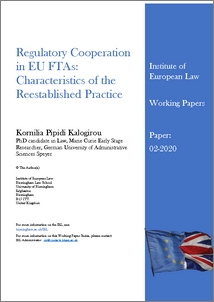 Preview |
|
| Renewables, Investments, and State Aids: Exploring the Legal Side of Polycentricity
The requirement to adopt minimum labour standards is now standard practice in free trade agreements negotiated by major trading powers such as the EU and US. However, such practice has historically been contested by developing countries, who contend that the requirement to increase labour and social... [ more ] The requirement to adopt minimum labour standards is now standard practice in free trade agreements negotiated by major trading powers such as the EU and US. However, such practice has historically been contested by developing countries, who contend that the requirement to increase labour and social protection standards is designed to remove one of the few competitive advantages that developing countries have over developed countries in attracting foreign investment. More recently, the EU and the US have also sought to use so-called ‘mega-regionals’ to promote labour standards. This was a significant development in that their proponents were keen to stress that these agreements would set the benchmark for labour protection provisions in FTAs, readily admitting that one of the central aims pursued by such agreements was to redefine the rules of the global trading system. The paper aims to assess the labour standards provisions included in EU and US FTAs, determine the rationale behind the inclusion of such provisions, and examine the extent to which mega-regionals such as the TTIP and the TPP marked a significant departure from past practice. | Author : Bellantuono, Giuseppe (Professor) Date : 22 October 2017 Source : Working Paper. University of Birmingham. Collection : IEL Working Papers | ![[img]](/3048/1.hassmallThumbnailVersion/IEL_Working_Paper_04%2D2017_%2D_Bellantuono.pdf) 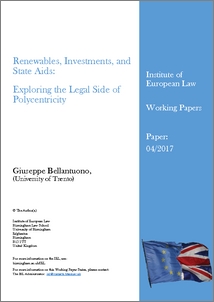 Preview |
|
| The Banking Union: Agencies and the Lesson from the US | Author : Lonardo, Luigi Date : 2016 Source : Working Paper. University of Birmingham. Collection : IEL Working Papers | ![[img]](/2190/1.hassmallThumbnailVersion/IEL_Working_Paper_7%2D2016.pdf) 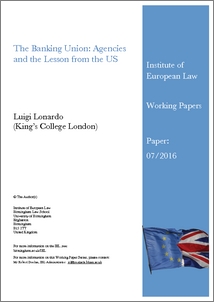 Preview |
|
| The EU Sustainable Public Procurement Reform:
the Green, the Mandatory and the Digital | Author : Sava, Nadia-Ariadna Date : 04 December 2024 Source : Working Paper. University of Birmingham. Collection : IEL Working Papers | ![[img]](/style/images/fileicons/application_pdf.png) ![]() Preview |
|
| The Eurasian Economic Union: Balancing Sovereignty and Integration | Author : Dragneva, Rilka Date : 09 November 2016 Source : Working Paper. University of Birmingham. Collection : IEL Working Papers | ![[img]](/2220/1.hassmallThumbnailVersion/IEL_Working_Paper_10%2D2016%2Ddragneva.pdf) 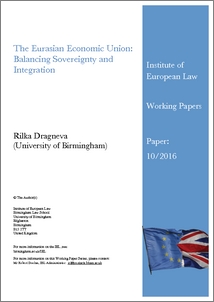 Preview |
|
| The Legal Foundations of a European ArmyA European Army featured at the very beginning of the European integration process. In the early 1950s the ‘Plan Pléven’ proposed to establish a European Defence Community comprising inter alia of an integrated European Defence Force. However, the plan failed and the notion of a European army disapp... [ more ] A European Army featured at the very beginning of the European integration process. In the early 1950s the ‘Plan Pléven’ proposed to establish a European Defence Community comprising inter alia of an integrated European Defence Force. However, the plan failed and the notion of a European army disappeared from the European agenda for a long time. While the creation of a European army is controversial and not very likely in the short term, the (Common) European Security and Defence Policy developed since the late 1990s might well lead to a permanent European military force in the medium or long term. However, so far EU military missions (in Bosnia, the DRC, Mali, or the Horn of Africa), while based on a permanent intergovernmental framework and EU military bodies, have been conducted by forces made up of national Member State forces formed on an ad hoc basis. The paper will examine the legal and policy arguments for a European army and discuss how the existing legal framework under the Treaty of Lisbon would need to be reformed to permit the establishment of such an entity. | Author : Trybus, Martin Date : 2016 Source : Working Paper. University of Birmingham. Collection : IEL Working Papers | ![[img]](/2105/1.hassmallThumbnailVersion/IELWorkingPaper2016No1The_Legal_Foundations_of_a_European_Army.pdf) 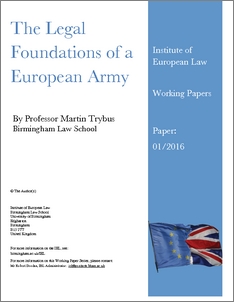 Preview |
|
| The Roads to Reversing Brexit: Local and Transnational Constitutional Principles | Author : Howse, Robert Date : 03 August 2018 Source : Working Paper. University of Birmingham. Collection : IEL Working Papers | ![[img]](/3176/1.hassmallThumbnailVersion/Howse_The_roads_to_reversing_Brexit_Institute_of_European_Law_Working_Papers.pdf) 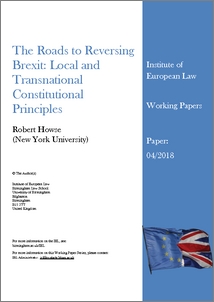 Preview |
|
| The WTO Dispute Settlement System as a Forum for Climate Litigation?This article examines whether and to what extent the Dispute Settlement System (DSS) of the World Trade Organization (WTO) could and should serve as a venue for international climate litigation. The article tackles these questions in three parts. First, it maps the nature and features of a trade-rel... [ more ] This article examines whether and to what extent the Dispute Settlement System (DSS) of the World Trade Organization (WTO) could and should serve as a venue for international climate litigation. The article tackles these questions in three parts. First, it maps the nature and features of a trade-related climate litigation. Second, it considers the prospect of such litigation under existing substantive and procedural rules of the WTO. Third, it investigates whether the WTO DSS should serve as a venue for climate litigation. The article finds that while the prospect of pro- climate litigation remains limited, anti- climate litigation is likely to increase, and that the DSS is an appropriate venue for adjudicating such disputes. | Author : Asmelash, Henok Date : 14 November 2022 Source : Working Paper. University of Birmingham. Collection : IEL Working Papers | ![[img]](/style/images/fileicons/application_pdf.png) ![]() Preview |
|
| The Working Language of the CJEU: Time for a Change?It is well known that the working language of the CJEU is French. For many years, the status of French was unquestioned, but this is now changing. This article considers how French came to be chosen as the CJEU’s working language; the effect of that choice on the CJEU’s judicial method; and the feas... [ more ] It is well known that the working language of the CJEU is French. For many years, the status of French was unquestioned, but this is now changing. This article considers how French came to be chosen as the CJEU’s working language; the effect of that choice on the CJEU’s judicial method; and the feasibility and desirability of a change in the CJEU’s language practices. Has French become an impediment to the CJEU’s capacity to communicate effectively with its stakeholders? Should French be replaced or supplemented? If so, by what? Would any potential benefits that might accrue from changing the CJEU’s language practices be outweighed by the disruption that would be caused? Or do the political sensitivities in play simply make reform impossible? | Author : Arnull, Anthony Date : 09 January 2019 Source : Working Paper. University of Birmingham. Collection : IEL Working Papers | ![[img]](/3186/1.hassmallThumbnailVersion/IEL_Working_Paper_01%2D2019%2Darnull.pdf)  Preview |
|
| The accommodation of sustainability in the EU Internal Market public procurement system The main aim of this paper is to analyse the accommodation of sustainability considerations within the European Union’s (EU) Internal Market public procurement (PP) system. The paper investigates whether EU PP law can be used as a tool to further sustainability while advancing its main objective of ... [ more ] The main aim of this paper is to analyse the accommodation of sustainability considerations within the European Union’s (EU) Internal Market public procurement (PP) system. The paper investigates whether EU PP law can be used as a tool to further sustainability while advancing its main objective of removing barriers to trade and opening PP markets. | Author : Spataru, Natalia Date : 20 January 2024 Source : Working Paper. University of Birmingham. Collection : IEL Working Papers | ![[img]](/style/images/fileicons/application_pdf.png) ![]() Preview |
|
| The ‘humanity’ of the secular legal subject’: Reading the European Court of Human Rights’ decisions over the practice of veilingThe debate over the Muslim headscarf has become an arena of fervent discussion in Europe. Much of the debate reveals an attempt to explain the issue in binary terms, between modern, ‘secular’, universal and ‘religious’, traditional, local values. In this context, the hijab has become the symbol and ... [ more ] The debate over the Muslim headscarf has become an arena of fervent discussion in Europe. Much of the debate reveals an attempt to explain the issue in binary terms, between modern, ‘secular’, universal and ‘religious’, traditional, local values. In this context, the hijab has become the symbol and mirror of the so called ‘clash of civilisations’. Through the analysis of two cases sentenced by the European Court of Human Rights (ECHR), my argument is that the passionate debate over the veil is a false one as the hijab emerges as a visible symbol of a clash between two legal-political systems, similar but contingently dissimilar: in fact, both Islamists and liberals aim at establishing a singular, universal (positivized) law within the same territory through women’s body. Thus, what the analysis of the ‘hijab cases’ reveals, is not only the emergence of a specific fixed and monolithic Christian/secular/liberal law’s subject, but also that the universality of western thought has precluded the possibility of imagining different forms of humanities and, along with it, a legal pluralism able to deal with a new multi-religious Europe. | Author : Baldi, Giorgia Date : 2016 Source : Working Paper. University of Birmingham. Collection : IEL Working Papers | ![[img]](/2185/1.hassmallThumbnailVersion/IELWorkingPaper2016No3%2D_The_humanity_of_the_secular_subject.pdf) 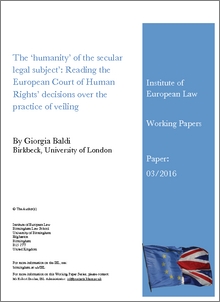 Preview |
|
| “Appellate Body Held Hostage”: Is Judicial Activism at Fair Trial? The World Trade Organization (WTO) Dispute Settlement System (DSS) is in peril. The Appellate Body (AB) is being held as a ‘hostage’ by the very architect and the most frequent user of WTO DSS, the United States of America. This will bring the whole DSS to a standstill as the inability of AB to revi... [ more ] The World Trade Organization (WTO) Dispute Settlement System (DSS) is in peril. The Appellate Body (AB) is being held as a ‘hostage’ by the very architect and the most frequent user of WTO DSS, the United States of America. This will bring the whole DSS to a standstill as the inability of AB to review the appeals will have a kill-off effect on the binding value of Panel rulings. If the most celebrated DSS collapses, the members would not be able to enforce their WTO rights. The WTO-inconsistent practices and violations would increase and remain unchallenged. The rights without remedies would soon lose their charm, and we might witness a higher and faster drift away from multilateral trade regulation. This is a grave situation. This piece is an academic attempt to analyse and diffuse the key points of criticism against AB. A comprehensive assessment of reasons behind this criticism could be a starting point to resolve this gridlock. The first part of this Article investigates the reasons and motivations of the US behind these actions as we cannot address the problems without understanding them in a comprehensive manner. The second part looks at this issue from a systemic angle as it seeks to address the debate on whether WTO resembles common or civil law, as most of the criticism directed towards judicial activism and overreach is “much ado about nothing”. The concluding part of this piece briefly looks at the proposals already made by scholars to resolve this deadlock, and it leaves the readers with a fresh proposal to deliberate upon. | Author : Bahri, Amrita Date : 07 June 2019 Source : Working Paper. University of Birmingham. Collection : IEL Working Papers | ![[img]](/3220/1.hassmallThumbnailVersion/IEL_Working_Paper_03%2D2019_Bahri.pdf) 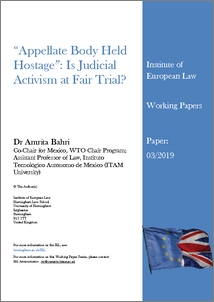 Preview |
|
|
This list was generated on Fri Apr 4 01:46:48 2025 IST. |

